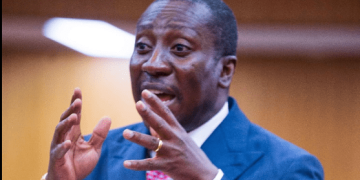Former Deputy Managing Director of the National Investment Bank (NIB) and a member of the government, Mr Alfred Thompson, has indicated that the government of President Nana Addo Dankwa Akufo-Addo is determined to grow local industries hence the move to reverse the 50% benchmark policy.
He indicated that the removal of the discounts on the affected items would lead to local production of the commodities on a higher scale.
This, he said, is expected to result in the growth of the local industry and the currency.
The government had announced the benchmark value, which is the amount taxable on imports, was reduced by 50 per cent for some goods.
The government had hoped that this was going to scale up the volume of transactions to make Ghana’s ports competitive.
The reversal affects 143 items under three categories prescribed by the Ghana Revenue Authority.
But this decision met opposition from trade unions including the Ghana Union of Traders Association (GUTA) and Importers and Exporters Association of Ghana (IEAG).
The Executive Secretary of the IEAG, Sampson Asaki Awingobit, served notice to sue the government over the reversal of the 50 per cent benchmark on the value on imports if the GRA does not stop the move.
Speaking on the Key Points on TV3/3FM on Saturday, January 8, Mr Thompson said “We are not saying the fact that we have local industries doesn’t mean we won’t import. We are growing rice here but we are still importing rice.
“You don’t start something and immediately you meet demand locally, you cant. It is a process and that is why it will take time but you have to start somewhere.
“If you don’t start somewhere, you will not get anywhere and government is keen on making sure that we grow this country locally. People should be empowered to stand on their feet and say, I have been able to start this factory.”
He added “When you buy goods from outside you are creating employment for foreigners and it affects your currency. Our policy is to grow, establish local people.”
Source: 3news



















































































